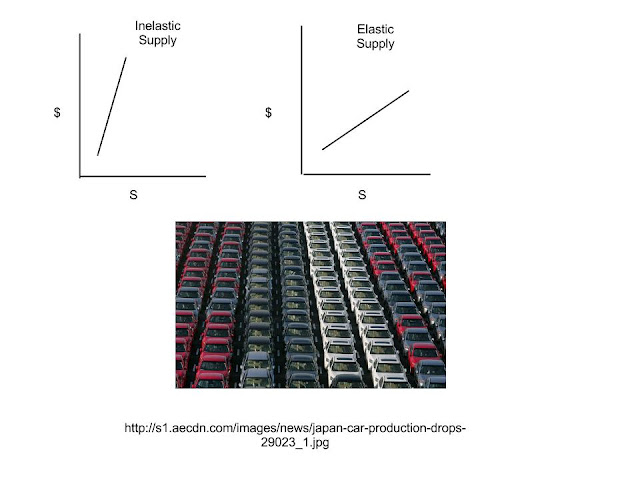Monday, October 29, 2012
Minimum Wage
I support minimum wage because it helps ensure a quality of life for Americans who are in poverty. By existing, minimum wage can end up cutting the amount of jobs a business can offer, but it does help keep up production no matter how much people oppose it. It does this by helping keep up workers motivation. If workers worked for any less then the current wage its undeniable that people would be beyond upset and in poverty. minimum wage helps keep Americans alive, even with how little it is. I feel that the minimum wage should be raised. Yes it will cut down on production, but we already have a surplus as it is so that should help some businesses with the raise. It shouldn't necessarily be raised to $10/hour but i think it should be raised because it would help support so many more Americans. But is we did raise it we would have to help support it with other price controls to maintain a healthy, growing economy.
Price Floors
I definitely support price floors because they help produce an overall more wealthy economy. In a situation where a price floor would be put into effect a surplus would be a result. In my opinion a surplus is better then a shortage and produces an environment where economic growth is more of a possibility than an environment where there is a shortage. However floors do have their downfalls and can affect production, but I feel that overall floors have more benefits when they are put into place in a controlled environment.
Price Ceilings
I oppose the idea the price ceilings have a place in our economy. I feel this way because price ceilings produce shortages and make it difficult to produce in the long run. I believe that in special circumstances a price ceiling may be the answer, but those times are extremely rare in my opinion. Price ceilings may be a short term fix that exist for a short period of time, but in the long run they over all cause more harm than they help.
Tuesday, October 23, 2012
Monday, October 15, 2012
Sunday, October 14, 2012
Thursday, October 11, 2012
Demand Wrap Up
Inelastic Demand
Inelastic demand is when a good or service is needed, and obtained by consumers with little attention payed for the good. So basically, the supply and demand are hardly affected by the price. I have experienced this sort of demand in my life through my dads Business. My Dad is a Site Core Developer now but before he was trained three years ago to be specialized in this field he was a normal run of the mill developer and computer engineer. His job used to be very generalized and there were a lot of people that could do what he did so his business was elastic because there were many substitutes to his work. Once he became specialized with Site Core and started his own business I experienced how inelastic demand worked. My dad was able to charge more for his services because his services were required by a lot of large businesses and it was a specialized field. What makes this inelastic is that the supply and demand of his service was hardly affected by the price of his service.
I have been able to connect to both elastic and inelastic demand because I experienced how it can affect a business and income of a family. What are other ways that are less complicated then this that are good examples to use to try and explain this to people? And how can people relate with it when they haven't seen it from the side of the supplier?
Wednesday, October 3, 2012
Headlines Assignment
Complementary Demand: "Spike in whip and spur sales at the St. Paul Rodeo."
Substitute Demand: "Electric car sales spark as gasoline car sales skid to A screeching halt."
Elastic Demand: "Ice cream prices soar while sales numbers melt away."
Inelastic Demand: "Electric bills spike, leaving consumers sweating."
Electric bills spike, leaving consumers sweating.
Over the summer of 2012 a massive heat wave hit the northwest. Being normally cool region throughout the year, Oregonians were unaccustomed to having to crank up the AC during the summer months. Many Oregonians struggled with dealing with the heat. Some tried to go to the river to keep cool while others would leave windows and doors open to create some sort of cool draft through their houses. After many trials and fails Oregonians had a decision to make, many choosing to give up efforts at keeping the AC off and dealing with the heat.
Most Oregonians decided to turn on their AC units in their homes to keep cool. With temperatures exceeding 100 degrees, homeowners had to crank up their AC in order to keep their homes at a livable temperature. The result of this massive swell of energy use as a consequence of homeowners using the AC made energy bills sky rocket. With no other alternative, people chose to continue use of their AC for the reason that there was no better alternative short of moving to Antarctica to escape the heat.
Tuesday, October 2, 2012
Subscribe to:
Comments (Atom)




.jpg)

.jpg)